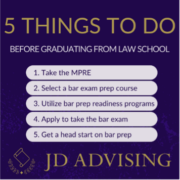MPT Grading: What Score Would I Get?
MPT Grading: What Score Would I Get?
MPT grading can be a hard concept to wrap your head around. While there is generally a legal solution that is the most accurate conclusion, an MPT is not as cut and dry as an MBE problem. It’s also not as straightforward as the MEE, which has far fewer legal issues and facts to consider. Your score on the MPT can be a little more subjective. In order to guarantee you pick up as many points as you can, you need to consider MPT grading principles. There are many things you can think about as you write, and then as you review, to ensure you have a high scoring MPT answer.
MPT Grading: What Score Would I Get?
After you’ve completed a practice MPT, it is important to attempt to self-grade it. You need to have an understanding of what your strengths and weaknesses were when it came to putting together your response. Only then will you know how to improve on your next attempt. When you are reviewing your answer, evaluate it in response to the following questions that incorporate important MPT grading principles:
1. Organizational and mechanical MPT grading questions:
- Did I organize and format my task appropriately?
- Did I complete the task within the time constraints?
Answering no to these questions will hurt your score. The Examiners will be looking to see if you’ve formatted your answer correctly and that you’ve followed all organizational instructions in the task memo. They also want to make sure that you’ve completed the task. If you didn’t, then it is clear that you didn’t manage your time properly. All of these errors will take away from the quality of your response.
2. Writing style MPT grading questions:
- Is the tone appropriate (persuasive or objective)?
- Did I communicate clearly and eloquently given the time constraints?
- Is my communication manner appropriate for my audience (e.g. if you are writing to a layperson, you should not be using legalese!)?
Using the proper tone is critical because it demonstrates you understand the objective of the task. Understanding when to write persuasively or objectively is a very important skill for a lawyer, and the Examiners will test that on the MPT. You also need to be sure that you are properly communicating your arguments in a quality manner. While a grader does understand the time constraints, you don’t want your answer to appear choppy, rushed or incomplete. Further, you don’t want to be using language that your target audience wouldn’t understand! Keep all of these MPT grading principles in mind when writing your response to make sure it is of satisfactory quality.
3. Substantive legal MPT grading questions:
- Did I identify the problem?
- Does my answer respond to the task posed?
- Are the relevant legal issues identified?
- Did I use the relevant facts from cases and did I appropriately analyze the facts I was given?
- Are all ethical dilemmas present resolved?
Crafting a strong, accurate legal analysis is certainly where you are going to pick up the majority of your points. After all, the bar exam is testing how well you can understand, interpret, and apply the law to various situations. You need to demonstrate that you can handle these tasks accurately in the real world. Being able to identify the problem and relevant legal issues is an essential skill. You need to thoroughly address these problems by applying the law you have to your facts. Compare the facts in the cases you are given with the ones in your problem to strengthen your argument and weaken any counterarguments. If you’ve done these things accurately, you stand a great chance of earning a higher score!
MPT Grading Rubric
When trying to figure out your MPT score, review the following rubric to help you understand your approximate MPT score:
Score of 6: A 6 answer is a very good answer. A 6 answer indicates that the applicant has a thorough comprehension of the task, the relevant factual and legal materials, and uses them to write a legally supported, well-written responsive product in the time allotted.
Score of 5: A 5 answer is an above average answer. A 5 answer demonstrates that the applicant has a fairly complete understanding of the task, understands most of the relevant materials, and uses them to write a legally supported, reasonably well-written, mostly responsive product in the time allotted.
Score of 4: A 4 answer is an average answer. A 4 answer indicates that an applicant has a fair understanding of the task and understands enough of the relevant materials to incorporate them into a satisfactory, though not completely responsive, product in the time allotted.
Score of 3: A 3 answer is a somewhat below average answer. A 3 answer is inadequate. It shows that the applicant has a limited understanding of the facts, issues, and applicable principles of law and is not able to write a satisfactorily responsive product in the time allotted.
Score of 2: A 2 answer is a below average answer. A 2 answer is significantly flawed and shows that the applicant has only a basic understanding of the task. It shows the applicant failed to grasp most of the relevant facts and law and thus has not produced a useful product in the time allotted.
Score of 1: A 1 answer is a well below average answer. It indicates a failure to understand the task. A 1 answer shows virtually no ability to identify the relevant facts or law in the time allotted.
Score of 0: A 0 answer is appropriate when an applicant does not write an answer at all. It is also appropriate if an answer is completely unresponsive to the question.
Laura Sigler, a JD Advising researcher and essay grader, wrote this post.
Need Expert MPT Guidance?
🔥 Top-Rated MPT Resources
- New MPT One-Sheets: Discover crucial formats and tips distilled to simplicity.
- MPT Private Tutoring: Opt for personalized strategies and guidance to elevate your preparation.
- Bar Exam Crash Course and Mini Outlines: Gain a comprehensive understanding of the big picture.
- MPT Mastery Class: Deepen your understanding and skills for MPT excellence.
- Comprehensive MPT Guide: Navigate the MPT process with our step-by-step guide.
- Targeted MPT Feedback: Refine your approach with structural and organizational insights.
- Real MPT Questions Compilation (2000 to present): Engage in hands-on practice to enhance your readiness.
Plus, don’t miss our Free Bar Exam Resource Center filled with our top free resources and expert insights!
Need Expert MPT Guidance?
🔥 Top-Rated MPT Resources
- New MPT One-Sheets: Discover crucial formats and tips distilled to simplicity.
- MPT Private Tutoring: Opt for personalized strategies and guidance to elevate your preparation.
- Bar Exam Crash Course and Mini Outlines: Gain a comprehensive understanding of the big picture.
- MPT Mastery Class: Deepen your understanding and skills for MPT excellence.
- Comprehensive MPT Guide: Navigate the MPT process with our step-by-step guide.
- Targeted MPT Feedback: Refine your approach with structural and organizational insights.
- Real MPT Questions Compilation (2000 to present): Engage in hands-on practice to enhance your readiness.
Plus, don’t miss our Free Bar Exam Resource Center filled with our top free resources and expert insights!





Leave a Reply
Want to join the discussion?Feel free to contribute!